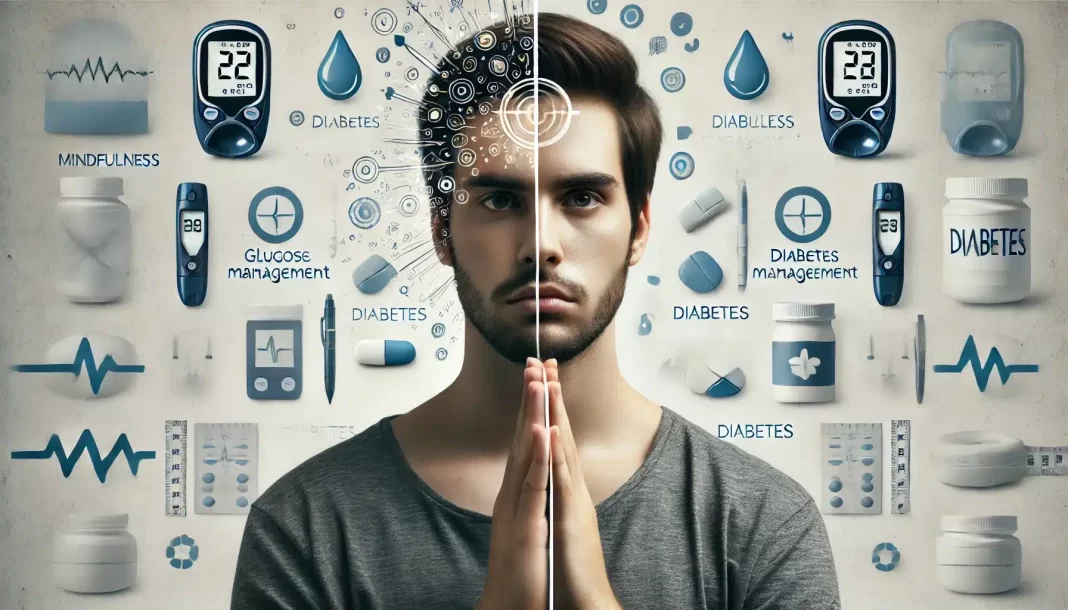Discover how mindfulness and meditation can help manage diabetes by improving blood sugar levels and reducing stress, empowering you to live well with the condition.
Mindfulness and meditation have become important tools for those managing diabetes, particularly as they offer both mental and physical health benefits. For individuals living with type 1 or type 2 diabetes, daily mindfulness practices can reduce stress, improve blood sugar control, and promote better overall well-being. Incorporating mindfulness into a diabetes management plan can not only help regulate glycemic control but also enhance emotional health, which is key to living well with a chronic condition.
How Mindfulness and Meditation Benefit Diabetes
- Improved Blood Sugar Control:
Mindfulness meditation has been shown to have a positive impact on blood glucose levels. Studies suggest that mindfulness practice can help lower fasting blood sugar and improve HbA1C levels, a critical marker for long-term glucose control. By reducing stress and promoting relaxation, mindfulness directly impacts how the body manages glucose. Stress is a well-known factor that can cause spikes in blood sugar, so practicing meditation helps counteract this effect(Diabetes Free Life,Rupa Health). - Stress Reduction:
Managing diabetes can be stressful, with daily decisions around food, exercise, medications, and blood sugar monitoring. Stress exacerbates blood sugar imbalances and makes management more challenging. Mindfulness helps to lower cortisol, a hormone linked to stress, which can result in improved glycemic control. A calmer mental state can also help individuals make healthier lifestyle choices, from diet to exercise, which further contributes to effective diabetes management(DiaTribe). - Emotional Regulation and Mental Well-being:
People with diabetes often experience diabetes distress, which includes feelings of frustration, anxiety, and depression related to the burden of managing the condition. Mindfulness practices, including meditation and body scans, offer a way to manage these emotions, helping patients regulate their mood and reduce negative thought patterns. By improving mental clarity and emotional balance, mindfulness helps to ease the psychological weight of living with diabetes(Rupa Health,DiaTribe).
Practical Mindfulness Techniques for Diabetes
Here are a few simple techniques to integrate mindfulness into your diabetes care routine:
- Mindful Eating: Eating mindfully involves focusing on the experience of eating without distractions. Pay attention to flavors, textures, and feelings of fullness or hunger. This practice can help prevent emotional eating and promote more balanced blood sugar levels(Diabetes Free Life).
- Breathing Exercises: Regular breathing exercises, even for just 10 minutes a day, can help reduce stress levels. By focusing on slow, deep breaths, individuals can calm their minds and bodies, which helps stabilize glucose levels.
- Body Scan Meditation: A body scan involves mentally scanning your body from head to toe, paying attention to sensations and feelings in each area. This technique not only promotes relaxation but also helps patients become more in tune with their physical state, potentially noticing early signs of stress or high blood sugar.
Why It Matters
Managing diabetes effectively requires more than just medication and diet control. Mindfulness and meditation offer a holistic approach to living well with diabetes by promoting both mental clarity and physical health. These practices can reduce the burden of diabetes-related distress and provide individuals with the tools to handle the daily challenges of managing their condition. Mindfulness empowers individuals to be proactive about their health, promoting better self-care and emotional resilience.
Conclusion
Incorporating mindfulness and meditation into a diabetes management plan can have a transformative effect on both physical and emotional well-being. These practices offer individuals with diabetes the chance to take control of their condition through better stress management, improved blood sugar regulation, and enhanced mental health. As research continues to highlight the benefits of mindfulness, it’s becoming an essential tool for living well with diabetes.
Sources:
Related





